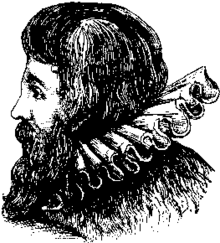The Scholemaster
| Roger Ascham | |
|---|---|

Sketch of Roger Ascham
|
|
| Born | c. 1515 Kirby Wiske, Yorkshire |
| Died | 30 December 1568 (aged c. 53) London |
| Nationality | English |
| Occupation | Scholar, didactic writer |
| Notable work | The Schoolmaster |
Roger Ascham (/ˈæskəm/; c. 1515 – 30 December 1568) was an English scholar and didactic writer, famous for his prose style, his promotion of the vernacular, and his theories of education. He acted as Princess Elizabeth's tutor in Greek and Latin between 1548 and 1550, and served in the administrations of Edward VI, Mary I, and Elizabeth I.
The name Ascham could be more properly spelt Askham, being derived from Askham near York. He was born at Kirby Wiske, a village in the North Riding of Yorkshire, near Northallerton, the third son of John Ascham, steward to Baron Scrope of Bolton. His mother, Margaret, is said to have come from the Conyers family, but this is speculation. Thomas and John were Roger's two older brothers, while Anthony Ascham was the youngest son of the Ascham family. The authority for this statement, as for most here concerning Ascham's early life, is his close friend Edward Grant (1540s–1601), headmaster of the venerable and still extant Royal College of St. Peter at Westminster—better known as Westminster School—who collected and edited his letters and delivered a panegyrical oration on his life in 1576.
Ascham was educated at the house of Sir Humphrey Wingfield, a barrister, Ascham tells us, in the Toxophilus under a tutor named R. Bond. His preferred sport was archery, and Sir Humphrey "would at term times bring down from London both bows and shafts and go with them himself to see them shoot". Hence Ascham's earliest English work, the Toxophilus, the importance which he attributed to archery in educational establishments, and probably the reason for archery in the statutes of St Albans, Harrow and other Elizabethan schools.
...
Wikipedia
